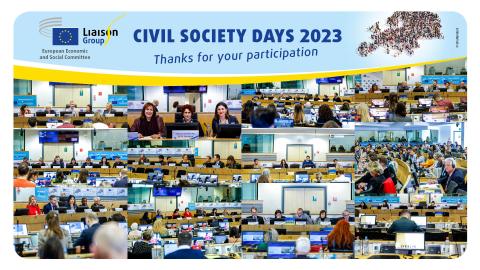European Economic
and Social Committee
Glass half full: Civil Society Days actors are concerned but also confident about the future of civil society in Europe
The EESC's Civil Society Days 2023 ended on 3 March with a set of proposals to not only protect but also expand the EU's civic space and ensure younger generations a solid foundation where they can build a vibrant civil society.
The three-day event wound up with a look at the future of participatory and deliberative democracy, and a panel discussion entitled "Organised civil society by 2050: Empowering our youth for today and tomorrow".
The lessons learnt from the Conference on the Future of Europe took centre stage in the closing workshop, with civil society organisations painting a mixed picture, while representatives of EU institutions stressed that despite undeniable difficulties and limitations, the citizen panels had produced a key deliverable: a set of 49 proposals that would be used as a compass for EU action and also to set a precedent.
The final panel discussion looked at critical issues affecting young people engaged in civil society organisations and presented a variety of perspectives from the Balkans to Sweden, together with the key findings of an OECD report entitled "The Protection and Promotion of Civil Space".
Workshop conclusions
The final session also saw the presentation of a first set of conclusions from the eight workshops that were held over the three-day event under the leadership of European umbrella organisations operating in the areas addressed by the workshops. The main conclusions were the following.
- Civil society organisations can help democratise the European semester if given a say. They can help shape both analysis and policy proposals at EU level and national reform programmes. They can put pressure on governments to tackle country-specific recommendations when they are slow, or improve reform ownership when they face pushback, such as with pension reform schemes or greening plans.
- Participatory democracy requires skills, especially transversal competences such as cooperation, critical thinking and conflict resolution. If we want young Europeans to be democratically literate, these skills should have a central place in both formal and informal education.
- Civil society organisations often struggle to access funds. What they need is an enabling cross-border legal, tax and policy framework, and increased access to both private and public sustainable resources. More flexible rules on core funding, also for private cross-border philanthropy work, would also be beneficial.
- Civic space is shrinking in central and eastern Europe. Yet the Russian war of aggression against Ukraine has shown the need for and the benefits of a vibrant civil society ready to roll up its sleeves in a crisis. With heightened public focus, now is the time to push for better safeguards for human rights and democracy, and for a central place for civil society organisations in the democratic process.
- Volunteering should be an integral part of community planning for crisis prevention and response, which is currently not the case. It needs an enabling environment to flourish, with public funding reflecting its true cost and value. Declaring 2025 the European Year of Volunteers would be a fitting tribute to volunteers' contribution to resilience in Europe.
- Digital rights and digital participation will be ever more important. Guaranteeing fair access to the internet and to digital devices and skills is essential, especially for young people. It is the foundation for equal education and employment opportunities. EU legislators must also make sure that new technologies do not spell the end of decent jobs and of a decent workplace, and that young workers are protected from exploitative and oppressive practices in recruitment and HR management.
- The 2024 European elections are fast approaching against a backdrop of growing threats to democracy, low turnouts and lingering anti-European sentiment. Civil society organisations can help the EU burst this bubble, reach out to voters that are far removed, reach them in their regions and in rural areas, and act as a bridge-builder. However, this will require new forms of communication (such as infotainment) and must be sustained over time.
- The role of transnational citizen panels in EU decision-making should be strengthened. Organised civil society should also play a bigger role in supporting deliberative democracy and complementing representative democracy. Organised civil society can help identity processes where they have an added value, and help organise and run the panels. It can also help follow up recommendations from citizen panels.
The full list of conclusions will soon be published on the EESC's website. The EESC will also make sure that they reach the larger EU institutions.
Civil Society Days are organised by the EESC in cooperation with its Liaison Group, which brings together pan-European civil society organisations and networks.
